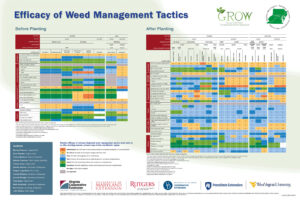Spring is the best time to plant new grapevines in New Jersey. You may be receiving ordered grapevines in the coming days or weeks. 1You must ensure that your planting material is healthy enough to avoid problems after planting. While it is a good idea to plant grapevines as soon as they arrive, inspecting the physical attributes of your ordered vines before planting may save you some troubles later. Nurseries send planting material on pre-determined dates hence; you should have enough time for a detailed inspection. [Read more…]
Recordings of Webinars – Ask the Expert Series Orchard Edition
Please use the below links to view or listen to the recordings from the first two sessions of Ask the Expert – Orchard Edition.
March 19
Tree Fruit Growers Meeting – I: https://go.rutgers.edu/n7v5agck
- Peach Rootstock Performance in Recent Trial
Dr. James Schupp, Professor of Pomology, Penn State Uni.
Tactics for Improved Weed Management in Orchards
Dr. Thierry Besancon, Extension Specialist, Weed Science, Rutgers NJAES
March 24
Tree Fruit Growers Meeting – II: https://go.rutgers.edu/wu2zgt6y
- 2021 Tree Fruit Diseases to Prepare for.
Dr. Norman Lallancette, Extension Specialist, Tree Fruit Pathology, Rutgers NJAES
Dr. Kari Peters, Tree Fruit Pathologist, Penn State Uni.
What water test do you need and how often do you need to do it?
FSMA Produce Safety Rule compliance, third party audit standards, and general best practices all include the need for irrigation, harvest, cleaning, sanitation, handwashing, pesticide application, drinking and postharvest water testing. Not all tests are the same, but all cost money, so make sure what your paying for meets your needs.

Here are the questions we commonly get from produce growers and answers that we hope you find helpful:
What water test do I need for a water source that is used only for irrigation of crops and/or pesticide applications?
– This water should be tested for generic E. coli, acceptable results give you a number answer of 126 CFU (colony forming units) or MPN (most probable number) or less. You do not want a presence/absence (P/A) test. A P/A test would not be sufficient for a third-party audit requirement or the FSMA PSR.
-Most water testing labs on the NJ Water Testing Lab Map (link below) offer the EPA 1603 analysis, which satisfies both the FSMA PSR anticipated requirements and third-party audit requirements.
-Other acceptable analysis methods are described on the
Produce Safety Alliance Water Analysis Method Requirement fact sheet.
-Well water sources used for irrigation should be tested once a year.
-Surface water sources should be tested at least three times during their period of use, ideally when starting irrigation, mid-season, and close to harvest. Surface water sources include irrigation ponds (spring fed, well fed, or other ponds), streams, rivers, and other bodies of water that are exposed to the surface.
-Municipal water sources used for irrigation should have a copy of the water testing record on file. These testing records are often found online or are available upon request. Made sure that generic E. coli is listed on the report.
What water test do I need for a water source that is used during the harvest process? Handwashing water? Cleaning and sanitizing use? Postharvest washing and cooling water?
[Read more…]
Grower Input Needed for the Spotted-Wing Drosophila Organic Management Project
Dear Fruit Growers and Industry Professionals:
Please take a few minutes to fill out this spotted-wing drosophila (SWD) survey:
https://ugeorgia.ca1.qualtrics.com/jfe/form/SV_3NVhWTGnleU3bP7
This multi-state survey aims to help us to evaluate our research and educational efforts. Your participation will help us determine how growers and industry professionals have benefited from this project by asking questions regarding best management practices and satisfaction with the team’s efforts to organically combat the SWD pest.
Your answers will help improve our research and educational efforts to address this pest as well as providing accountability to our funder, the United States Department of Agriculture, National Institute of Food and Agriculture (USDA-NIFA). All responses are anonymous. No personal information will be collected.
Thank you for your time and interest in our efforts.
Dr. Cesar Rodriguez-Saona (Entomology)
On behalf of The SWD Research and Extension Team
Value-Added Producer Grants in New Jersey
Grant.gov applications are due by April 29, 2021 and
paper applications must be postmarked by May 4, 2021
The Value-Added Producer Grant (VAPG) program administered by the USDA’s Rural Development Agency (RD), helps agricultural producers enter into value-added activities related to the processing and marketing of new products. The goals of this program are to generate new products, create and expand marketing opportunities, and increase producer income. [Read more…]
Comparing the Efficacy of Various Integrated Weed Management Tactics

Integrated weed management (IWM) combines various methods to reduce or eliminate the effect of weeds on crop production over time, using a combination of practices that are most effective for solving specific weed issues. These weed management techniques form a “toolbox” in which each “tool” can be integrated into a weed management plan catered to the particular farm and problem. The toolbox includes preventative, biological, chemical, cultural, and mechanical strategies. IWM also considers the weed species present and tailors strategies for these species.
A collaborative effort led by Dr. Michael Flessner with Virginia Tec has been developed to compare the efficacy of various integrated weed management tactics before and after planting at reducing the impact of common troublesome weed species. Other universities of the Mid-Atlantic Region (Rutgers, West Virginia University, Penn State, University of Delaware, and University of Maryland) have also participated to this project.
A poster providing relative effectiveness of various integrated weed management tactics for summer annual crops is now available (https://agweedsci.spes.vt.edu/extension/publications/iwm.html) and will help growers identify the most effective tactics to manage weeds.
